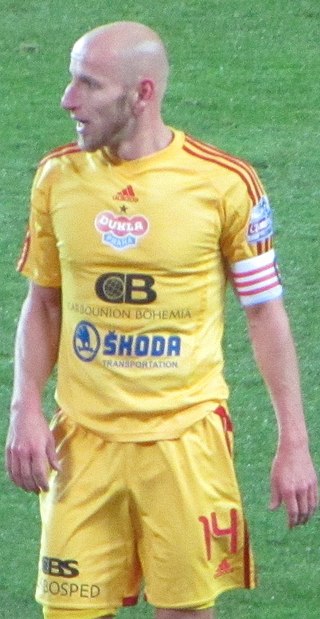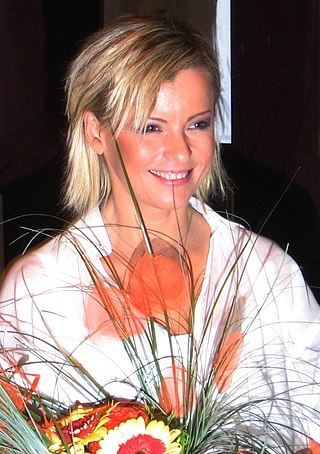
Lidové noviny is a daily newspaper published in Prague, the Czech Republic. It is the oldest Czech daily still in print, and a newspaper of record. It is a national news daily covering political, economic, cultural and scientific affairs, mostly with a centre-right, conservative view. It often hosts commentaries and opinions of prominent personalities from the Czech Republic and from abroad.

František Straka is a Czech former football player and current manager of Michalovce.

Vladimír Jiránek was a Czech illustrator, film director and cartoonist.

Parliamentary elections were held in the Czech Republic on 28–29 May 2010 to elect the 200 members of the Chamber of Deputies. The elections had been expected to take place sometime before the end of 2009, but was postponed due to legal challenges. Before the election, the country had been governed by a caretaker administration headed by Jan Fischer. The Czech Social Democratic Party (ČSSD) was the front-runner of the election and its leader Jiří Paroubek was the favourite to become the new Prime Minister.

Pavel Hašek is a Czech former football midfielder, who played in the 2000s and 2010s in the Czech First League.
Michal Ordoš is a Czech professional footballer who plays as a forward for FK Blansko.

Patrik Gedeon is a Czech footballer who plays for FC Chomutov, on loan from FK Dukla Prague. He has played international football for the Czech Republic.

Michal Horáček is a Czech entrepreneur, lyricist, poet, writer, journalist and music producer. From 2007 until 2010, he was the chairman of the Czech Academy of Popular Music. He founded Czech betting company Fortuna. He stood to become Czech president in the 2018 presidential election, but came in 4th in the first round, failing to advance.

Luboš Urban is a Czech football manager and former player.
Michal Zach is a Czech football manager. He managed FC Slovan Liberec and Bohemians 1905 in the 2007–08 Czech First League.

Presidential elections were held in the Czech Republic in January 2013, the country's first direct election for the presidency. No candidate received a majority of the votes in the first round on 11–12 January, so a second round runoff election was held on 25–26 January. Nine individuals secured enough signatures or support of parliamentarians to become official candidates for the office. Miloš Zeman of the Party of Civic Rights (SPOZ) and Karel Schwarzenberg of TOP 09 qualified for the second round, which was won by Zeman with 54.8% of the vote, compared to Schwarzenberg's 45.2%. Zeman assumed office in March 2013 after being sworn in.

The 2013 Czech political corruption scandal started with a raid against organized crime which was conducted in the Czech Republic in June 2013 by the Police Unit for Combating Organized Crime and the Chief Public Prosecutor's Office in Olomouc. It involved several highly positioned state officers and politicians, as well as controversial entrepreneurs and lobbyists. The scandal affected the top levels of Czech politics, including Prime Minister Petr Nečas and his coalition government. On 17 June 2013, it resulted in the resignation of the Prime Minister and the cabinet. Nečas also quit as leader of the Civic Democratic Party (ODS).

Iveta Bartošová was a Czech singer, actress and celebrity, three-time best female vocalist in the music poll Zlatý slavík. She was also known for her turbulent lifestyle attracting the attention of the Czech tabloid media.
Martin Pohl, better known by his stage name Řezník or M.Engele, is a controversial Czech rapper, an exponent of the horrorcore genre in the Czech Republic. He is known for his provocative songs glorifying violence against women, homeless people, drug addicts and gays. Řezník uses general horrorcore themes and he has collaborated with many interprets like King Gordy, Bizarre, Lex the Hex Master, Mastamind, Madchild, Necro, Brotha Lynch Hung, Sean Strange, Snowgoons, Scum, Razakel, The J. Hexx Project, Heaven, Psych Ward, members of Butcher's Harem, etc. According to a leaked poll result of the national Czech music award Český slavík, he won in 2013 in the category "Internet Star". He was, however, disqualified from the poll by the organizers, due to alleged objectionable conduct expressed in his songs. It led to protests of notable Czech artists, such as Tomáš Klus and Matěj Ruppert. On 29 November 2013, Tomáš Klus announced his departure from Český slavík, while Ruppert returned his own award which he received in 2006, accusing the organizers of censorship.

Debbi is a German-Czech singer of rock and pop music. She was a semi-finalist in the first season of television series Czech and Slovak SuperStar, and won the "Song of the Year" award for her song "Touch the Sun" at the 2010 Anděl Awards. She sings in Czech and English.

Milan Chovanec is a Czech politician. He served as Minister of the Interior of the Czech Republic in the Cabinet of Prime Minister Bohuslav Sobotka from 2014 to 2017, and served as acting leader of the Czech Social Democratic Party from June 2017 to February 2018. He was also a member of the Chamber of Deputies of the Czech Republic from 26 October 2013 until his resignation on 14 April 2019. Previously he served as governor of Plzeň Region between 2010 and 2014 and as a member of Plzeň City Council from 2002 until 2010.
Ludmila Brožová-Polednová was a Czech state prosecutor sentenced at age 86 in September 2008 to six years' imprisonment for her participation in the show trials of Milada Horáková and others in 1950, which led to at least four executions.

The Civic Democratic Party (ODS) leadership election of 2008 was a part of party's congress. It happened after ODS lost Senate election and regional elections. Incumbent leader and Prime Minister Mirek Topolánek faced Mayor of Prague Pavel Bém who was supported by President Václav Klaus.

Barbora Poláková is a Czech actress and singer.
Jindřich Rajchl is a Czech political activist, lawyer and former football ambassador. He gained a public profile as a leader of demonstrations against measures to control the COVID-19 pandemic in the Czech Republic, and subsequently also against the government of Petr Fiala. He is widely considered to be a participant in the spread of misinformation in the Czech Republic.



















